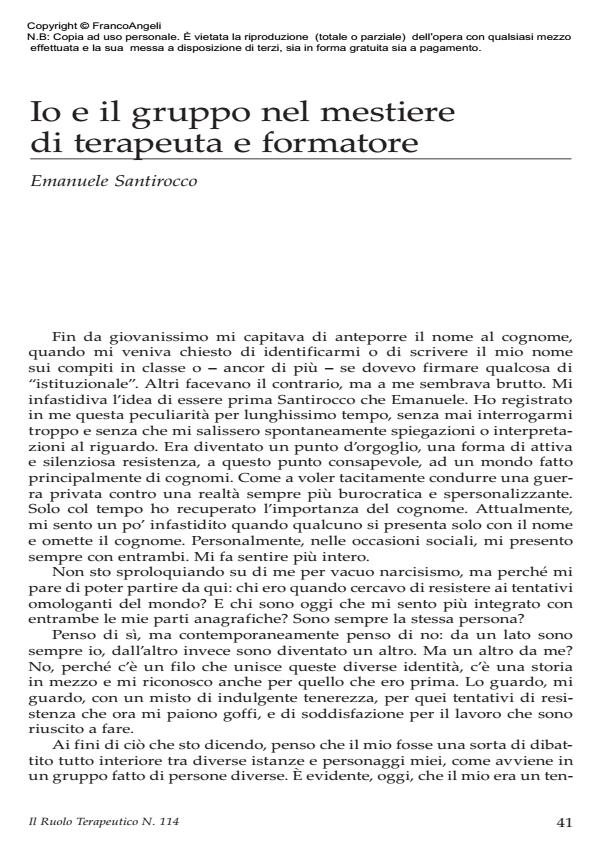Io e il gruppo nel mestiere di terapeuta e formatore
Journal title RUOLO TERAPEUTICO (IL)
Author/s Emanuele Santirocco
Publishing Year 2010 Issue 2010/114
Language Italian Pages 8 P. 41-48 File size 108 KB
DOI 10.3280/RT2010-114004
DOI is like a bar code for intellectual property: to have more infomation
click here
Below, you can see the article first page
If you want to buy this article in PDF format, you can do it, following the instructions to buy download credits

FrancoAngeli is member of Publishers International Linking Association, Inc (PILA), a not-for-profit association which run the CrossRef service enabling links to and from online scholarly content.
A person is formed by the relationships that he establishes from the first minute of life on. These are transactions with an emotional quality that include odours, colours, sounds and that are interiorized by the baby. These are psychic "grafts" fundamental for growth that strangely enough do not procure an immune reaction. All of this to point out the unlimited and somewhat mysterious subject of the communication from unconscious to conscious or of the passage of experiences and emotional content from one person to another, manifested also in the clinical situation. In the job of therapist and educator, the author admits to finding himself often caught up in his own emotional torment, which emerges from the encounter with the other. If treated adequately these constitute powerful instruments for understanding more about the other and oneself. In addition he adds that he does not pretend to define and categorize what is therapeutic and what is educative. The questions that he asks himself when he meets the other, whether patient or colleague, are: do I understand the human reality that I have here? Am I able to help, that is to act as witness to a presence? The roles of therapist and educator share the intention of governing complexity in the light of certain ethical principles. According to the author, the individual and the technique coincide, because he maintains that in this kind of job subjective critique is a primary necessity. In addition he adds that the one who presents the clinical case, regardless of the fact that he or she is in supervision or in training, has a weak point. The model to which the author refers is that of group supervision. Clinical case studies are presented.
Keywords: Relationship, group, unconscious, ethics, technique
Emanuele Santirocco, Io e il gruppo nel mestiere di terapeuta e formatore in "RUOLO TERAPEUTICO (IL)" 114/2010, pp 41-48, DOI: 10.3280/RT2010-114004